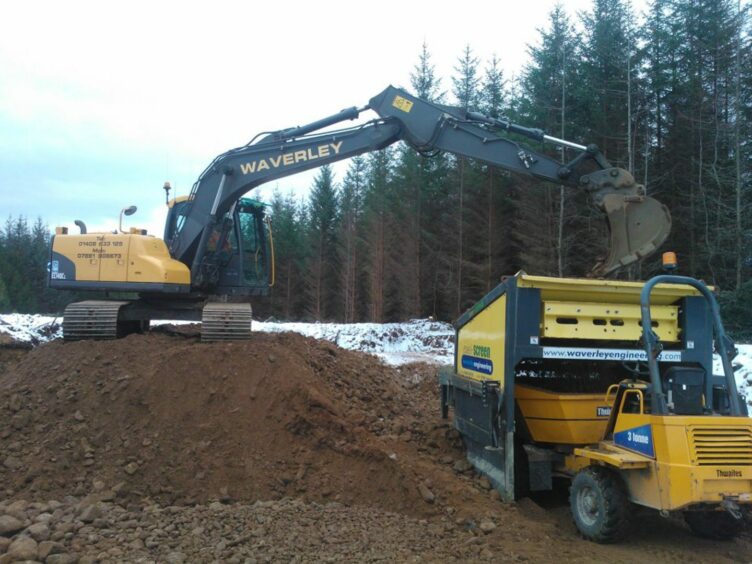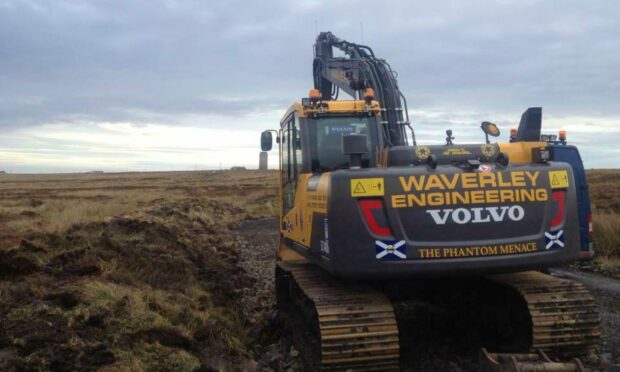It is the toughest time in business that brothers David and Richard Gordon have faced since they started their plant hire firm in Golspie 20 years ago.
The pair have been hit with a huge hike in fuel bills with the cost rising from £10,000 to £18,000 for the past three months.
Not only this but they have also been doing their best to help staff with double-digit rises in their own costs – as the cost of food and fuel in particular have all risen, while new figures reveal inflation has hit a new 41-year high.
Waverley Engineering has been giving employees weekly bonuses to help manage what is an unprecedented cost-of-living crisis – but they still need more, the firm said.
The effects are more keenly felt for the rural business and their staff, where the price of goods can be even more expensive.
Inflation rate higher than expected
Rising gas and electricity prices have driven headline inflation to its highest level for over 40 years, despite the Energy Price Guarantee coming into force – a government initiative to curb the cost of heating.
According to the Office for National Statistics (ONS), the rate of Consumer Prices Index (CPI) inflation rose to 11.1% in October from 10.1% in September – this is higher than expected.
According to the official statistics body, gas prices have climbed nearly 130% while electricity has risen by around 66%.
Meanwhile, a range of food items also pushed up the official rate of inflation.
READ: What is inflation and what does it mean for me?
Effects on rural businesses
Waverley Engineering supplies a range of machinery from excavators to dumpers and heavy plant to mini plant hire.
The Gordon brothers have also owned Macleod’s Coaches for the past five years.
He said: “We have found the increase in fuel a big challenge, especially as a rural business.
“We have got diggers and excavators that have gone from red diesel at 50p a litre to white diesel at about £2 a litre.
“The coach company has also been hit by the price of diesel.
“Everyone is aware that prices are going up everywhere for everything.
“It can be difficult because you can lose jobs if prices are too expensive.
“This has been the toughest period since we started but we are staying positive.”

The company does continue to invest with Macleod’s Coaches investing in two new coaches and recently winning some tenders from Highland Council for school runs during the next two years.
Staff have also been receiving a weekly bonus since the start of the year to help combat the cost of living crisis.
David said: “It’s something we decided to do to help and it’s continued.
“The aim was to help them out with their cost of living but with 10% for inflation they are starting to look for more.”
Employers are worried
Latest research by UMi, the national business support company, showed that more than two-thirds of UK SMEs are now feeling less confident about the future of their business than they did 12 months ago, during the Covid-19 pandemic.
The survey of more than 1,000 participants also found that 40% of SME business owners are having to explore increasing costs to the consumer to combat rising inflation and a further 36% are still looking to reduce their energy consumption in a bid to mitigate costly bills.
According to UMi, the top three biggest worries for SMEs across the country are:
- Energy and utilities (32%)
- Staff costs (22%)
- Fuel costs (12%)
UMi chief executive Nicki Clark said: “As a provider of business advice, we’ve been on the front line in supporting SMEs across the UK over the past six months as they navigate unprecedented trading conditions and this survey shows just how hard our SMEs are finding things in the face of economic uncertainty.”
UMi has launched its #CostofTradingCrisis campaign to help SMEs.
Businesses looking for support can take part in a free webinar series that will offer to help access support from financial and professional services firms to utilities and public sector support organisations.
Glimmer of hope?
One specialist said that although prices are still rising at an incredible rate, there are signs the pressure on prices might be easing.
Kevin Brown, savings specialist at lender Scottish Friendly, said: “Prices are now rising faster than they have since 1981 due to the cost of fuel, food and drink and transport all spiking again last month.
“It’s a bigger jump than was expected and it will raise fears that inflation has not yet reached its peak. However, there are still some early signs that price increases may soon begin to soften.
“Core inflation which excludes energy, food, tobacco and alcohol did not rise in October and remained flat at 5.8%.
“This provides a small glimmer of hope that the cost-of-living crisis may start to fade slightly sooner than previously expected.”


Conversation